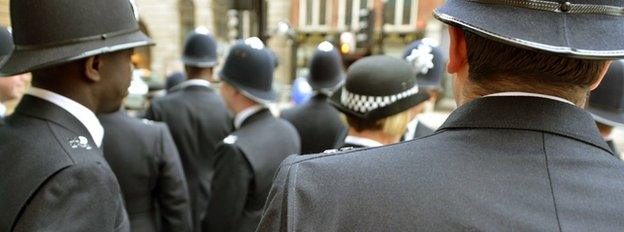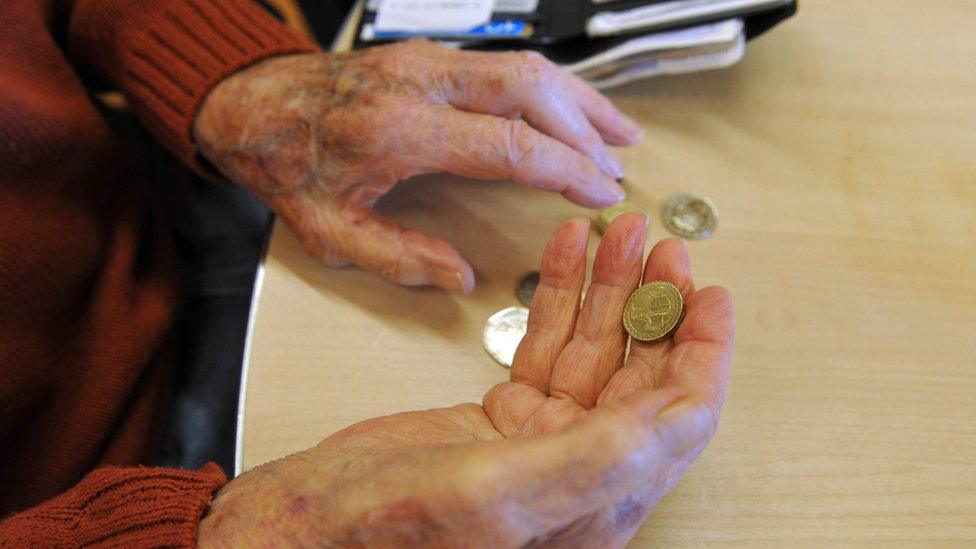Crime figures: 'Five million' fraud cases in past year
- Published
As June Kelly reports, the figures show the scale of cyber crime
There were more than five million incidents of fraud in England and Wales in the last year, estimates suggest.
The Office for National Statistics has published an estimate of fraud for the first time, external, based on its Crime Survey.
There were also 2.5 million cyber crime offences, such as computer hacking, the ONS estimated.
The Crime Survey indicated an 8% fall in crimes it covers. Separate data, based on reports to police, shows an overall rise in offending of 5%.
Official figures are drawn from two sources:
The Crime Survey of England and Wales (CSEW) - based on how many people say they have been the victim of a crime
Police figures - based on reports of crime to police
The two sets of figures have been published together for many years to give a more rounded impression of crime levels.
The police figures suggest a 25% increase in violence, with murders at their highest level for four years.
In the 12 months to the end of June there were 569 homicides, up 44 on the same period the year before.

Analysis

By Dominic Casciani, BBC Home Affairs correspondent
For years traditional crimes have been falling right across the Western world, irrespective of who's in government and how many police are on the beat.
But today's figures have captured for the first time an awful lot of criminality that, quite simply, looks like it has been missed.
If you add the official data for traditional crimes to the provisional figures for cyber and fraud, the number of offences breaches 14 million. That's still down on the 1995 peak of 19 million offences - but it's an awful lot higher than statisticians thought a year ago.
Many experts will now be having a "told you so" moment. Crime statistics sceptics say there's just not enough police and policy focus on 21st Century offending.
Criminality is rapidly changing - and the real question is 'Are the police in a good place to combat it?'

Just over half of the 5.1 million frauds included in the Crime Survey data involved some financial loss, the ONS said.
Where losses were reported, 78% got some form of compensation, with 62% reimbursed in full.
Frauds included card fraud and frauds committed over the phone and online. The fraud data was based on a sample of 2,000 people.
An ONS spokesman said: "Although we estimate that there were more than seven million fraud and computer misuse incidents in the past year, this does not necessarily imply a recent rise in crime as the new measures bring into scope a large volume of offences not previously included in the Crime Survey."
He added: "These new estimates should be seen in the context of a reduction over the past 20 years in the more traditional forms of crime, from 19 million incidents a year in 1995 to under seven million a year today."
'Narrowing gap'
The most common cyber crimes - committed under the Computer Misuse Act - were those where a victim's device was infected by a virus.
The category also includes the hacking of people's emails or social media accounts.
Overall, the Crime Survey estimated 6.5 million offences had taken place in England and Wales - down 8% from last year.
That figure does not include the fraud and cyber crime estimates.
If they were added, it would mean a total of 14.1 million crimes, but the ONS cautioned against combining the two sets of figures, saying the fraud and cyber data are "experimental" and based on a much smaller sample.
A spokesman said: "One is a proven set of national statistics and the other is not."

The most common cyber crimes involved a victim's device being infected by a virus
Crime Minister Mike Penning said crime rates were falling because of police reforms.
And he said the rise in violent and sexual crimes being reported was due to changes in how offences were recorded.
"Crime is falling and it is also changing, and we are committed to tackling fraud and cyber crime," he added.
A spokesman for the National Police Chiefs' Council said the fall in crime estimated by the Crime Survey figures was "encouraging".
Meanwhile, the increase in crime reported to police, he said, "reflects the efforts being made by forces to improve consistency in crime recording".
He added: "There is still a gap in what the public are experiencing and what is being reported to the police. However, it is extremely encouraging that the gap between the CSEW public survey and the recording of crime by the police continues to narrow."
- Published15 October 2015
